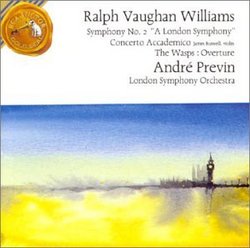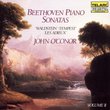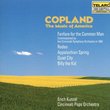| All Artists: James Oliver Buswell IV Title: Vaughan Williams: Symphony No. 2; The Wasps (Overture) Members Wishing: 0 Total Copies: 0 Label: RCA Release Date: 10/10/1990 Genre: Classical Styles: Forms & Genres, Concertos, Historical Periods, Modern, 20th, & 21st Century, Instruments, Strings, Symphonies Number of Discs: 1 SwapaCD Credits: 1 UPC: 090266058129 |
Search - James Oliver Buswell IV :: Vaughan Williams: Symphony No. 2; The Wasps (Overture)
 | James Oliver Buswell IV Vaughan Williams: Symphony No. 2; The Wasps (Overture) Genre: Classical
|
Larger Image |
CD DetailsSimilarly Requested CDs |
CD ReviewsGreat music! K. T. Ong | Singapore | 03/21/2004 (5 out of 5 stars) "Vaughan Williams' 2nd Symphony is supposed to be one of the composer's own favorites among all his works, and it certainly is loveable. Andre Previn's interpretation has a better grasp of the tempo than, say, Sir John Barbirolli's. If you like music that blows you through the ceiling with a deafening fortissimo after a long, quiet moment, you must listen to the first movement, which is perhaps one of the happiest, most cheerful and most joyous pieces of music ever composed. The second movement is slow and sad, but also full of human warmth, and it builds up to an absolutely immense climax before ebbing away again into meditative repose. After the sprightly, jaunty third movement comes the almost tragic final movement; you get the feeling of watching a sad but dignified procession into a magnificent sunset, and it builds up to a climax that makes you feel that something great is coming to an end. Then it quietens down into a long-drawn, contemplative flow, and slowly the music draws to a close..." My Favorite Symphony. G-Dexter | Lakewood, NY United States | 02/01/2005 (5 out of 5 stars) "I've owned this particular recording of the Vaughan Williams London Symphony for more than 15 years, and it remains my favorite symphonic work of all time. I've listened to this work while rocking my children to sleep, and it has served as the soundtrack in my mind to underscore the novels of Dickens, Palliser, Doyle and Clarke, to name but a few. While many pieces of 20th century classical music were written as a strictly abstract sound experience, this symphony seems to have been written expressly to conjure vivid images in your mind as you listen. The first movement opens softly and with an air of mystery, as though you are traveling through the predawn fog down the Thames river, and off in the distance you can hear Big Ben chiming the hour. Gradually the sun emerges and with great fanfare, the city awakens! Now the streets become busy with the commerce of the day, the hustle and bustle of the common people beginning their work day. The second movement captures the spirit and grandeur of the old city. A sad lament for glories lost, and of an empire diminished. Still, there is hopeful reflection on what may yet come to pass. The third movement starts at a frenetic pace, conjuring images of the industry and purpose of the city. Things are moving, changing, growing and evolving. There is an optimism and joy present, which is tempered at the end by a quiet moderation of the tempo. The final movement sweeps in dramatically, declaring the import of things to follow. At this point, a regal and grand theme is introduced, evoking images of the aristocracy and the higher purpose that London, the center of the great empire, inspires. Then in a final flourish, previous themes are weaved in and out to culminate in the fading light of a London day. Finally, the fog returns and the city becomes quiet as the day ends. Here again, Big Ben sounds the hour and the city reflects on the tragedies and triumphs of the day. André Previn does a remarkable job of conducting and interpreting this work, and the London Symphony Orchestra is flawless in their execution. I've heard this piece performed both live and on the radio, but have never found a version to rival this disc. Highly recommended. " A complete Vaughan Williams program, superbly done from begi Santa Fe Listener | Santa Fe, NM USA | 06/06/2010 (5 out of 5 stars) "If you want to skim the cream from Previn's early-70s Vaughan Williams cycle, this CD is the place to start. Unlike quite a few of the other installments, RCA's sound is clear, detailed, and full, with no evident flaws.The London Sym., recording RVW's Sym. #2 in 1972, were having a magical time with their music director; Previn had arrived in 1968 and after four years was riding high, especially in terms of execution. Anyone familiar with Boult's admired recording of "The Wasps" Over. will have his eyes opened -- this reading is more engaging, detailed, and probing. It does what somebody needed to do for a long time, knock the British off their comfy relationship with Vaughan Williams. As an outsider, Previn was ideally placed to throw open the windows and let a fresh wind blow through these overly familiar scores(not that the always took advantage).
In the unfortunately named Concerto Accademico, which despite its dusty title is quite a carefree, if modest excursion, Previn imports an American violinist, James Oliver Buswell. Composed in 1944-45, three decades after the "London" Sym., this short work with string accompaniment was premiered by the Hungarian violinist Jelly d'Aranyi (known to musical trivialists because she was told at a seance to perform the long-suppressed Schumann Violin Cto., as a result causing both a stir and a lawsuit from the composer's estate. Yet thanks to her, violinists gained a major new work). At 16 min., the Vaughan Williams piece, which he later wished to be known simply as the Violin Concerto, features a lovely, songful central Adagio that belies the wartime atmosphere in which it was born, and a rather anticlimactic final Presto that abruptly ends on a single soft note without coda or fanfare. Buswell's reading seems exemplary, but I can't pretend to have heard this work before. The clear-sounding recording dates from 1969. Even more of a wake-up call than The Wasps Over. is the stunning playing of the LSO in the Sym. #2, whose four movements portray London in different moods, places, and times, but with a prevailing nostalgia that almost every critic labels Dickensian. But RVW had contemporary London in mind, with such settings as Westminster at dawn, the Strand at noon, Bloomsbury Sq. in November, and the mouth of the Thames at night where it opens to the sea. Like the Sea Symphony that preceded it, the "London" Symphony is long at over 46 min. and panoramic (it was even longer in its original 1914 version, which the composer later trimmed; he continued his revisions until 1934). Previn's reading is again from an outsider's perspective. He paints no scenic pictures but approaches the score symphonically. The work doesn't really hang together as a symphony, being quite discursive and episodic. One hardly minds, given such a robust, urgent reading. Despite its many rivals, including a standout performance under Barbirolli on EMI, I'd venture to say that if you aren't a collector, Previn's admirable reading is the only one you need." |

 Track Listings (8) - Disc #1
Track Listings (8) - Disc #1
